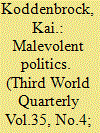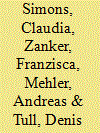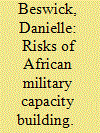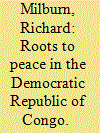|
|
|
Sort Order |
|
|
|
Items / Page
|
|
|
|
|
|
|
| Srl | Item |
| 1 |
ID:
133262


|
|
|
|
|
| Publication |
2014.
|
| Summary/Abstract |
Since the start of reporting during the 'Congo wars' in 1998 the International Crisis Group (icg) has been one of the most important sources of information for Western analysts, UN agencies and ngos dealing with the political and economic challenges of the Democratic Republic of Congo. This article takes a closer look at the way Congolese government politics is analysed in icg reports. It shows that the logics of government and the dilemmas of rule in a country with the size, geography and history of the DRC receive hardly any attention in icg reporting. Building on Klaus Schlichte's approach to the dilemmas of rule, the article argues that President Joseph Kabila has in fact responded skilfully to the dilemmas of elite inclusion across the different hubs of power and wealth from the Kivus to Katanga to the capital Kinshasa. While his political and human rights records are by no means impeccable, not all is rotten in the state of Congo, and the Kabila government deserves more analytical rigor and openness than is offered by the pathologising modes of analysis used by the icg.
|
|
|
|
|
|
|
|
|
|
|
|
|
|
|
|
| 2 |
ID:
124262


|
|
|
|
|
| Publication |
2013.
|
| Summary/Abstract |
Research on power-sharing in Africa remains silent on the effects of national peace agreements on the sub-national level. Conversely, most armed conflicts originate and are fought in (or over) specific areas. A plausible hypothesis would be that for power-sharing to have the desired pacifying effect throughout the national territory, it needs to be extended to the local level. Based on fieldwork in six former hotspots in Liberia, Burundi and the Democratic Republic of Congo (DRC) we find that there is hardly any local content, including local power-sharing, in national agreements. However, contrary to our hypothesis, neither local content (inclusion of actors or interest) nor local-power-sharing (either introducing a local power balance or monopoly) are indispensable to effectively bring about local peace, at least in the short-term. On the contrary, it might even endanger the peace process. The importance of the sub-national level is overestimated in some cases and romanticised in others. However, the history of spatial-political links, centralised policies, and the establishment of local balances or monopolies of power ultimately play an important role.
|
|
|
|
|
|
|
|
|
|
|
|
|
|
|
|
| 3 |
ID:
133248


|
|
|
|
|
| Publication |
2014.
|
| Summary/Abstract |
Civil war and insecurity are widely seen as obstacles to development and threats to international stability, and donors are therefore keen to develop African capacities to manage conflict on the continent. Building the capacity of African militaries is hazardous, however, given their frequent roles in coups, support for authoritarian regimes, and violence against civilians. This article argues that the risks of military capacity building can be assessed more accurately by understanding how national governments view and utilize the military as a policy tool. It demonstrates this using the case of post-genocide Rwanda, a significant contributor to African peacekeeping but also to instability in the Democratic Republic of Congo (DRC). The article identifies four features of the Rwandan regime's understanding and use of military force, using these to explain the dual and divisive role of Rwanda's military as an agent of instability on the one hand and peace on the other. Finally, the article explores the M23 crisis, considering implications for donor efforts to manage risks inherent in international commitments to "African solutions". It concludes by arguing that, as African military capacity building continues, recognizing the ways in which such enhanced forces are likely to be used will be crucial to developing a better understanding of the continent's peace and security prospects.
|
|
|
|
|
|
|
|
|
|
|
|
|
|
|
|
| 4 |
ID:
133287


|
|
|
|
|
| Publication |
2014.
|
| Summary/Abstract |
The Democratic Republic of Congo (DRC) is endowed with an abundance of natural resources, and the presence of high-value resources such as coltan and diamonds is well known. The country is also endowed with a wealth of biodiversity, although the value of this is often overlooked. This article describes the detrimental impact of armed conflict on this biodiversity and the dangers posed by the return of peace, which is likely to result in increased biodiversity exploitation. The resulting loss of key carbon sinks crucial to the global fight against climate change will affect not only the DRC, but also the international community. Biodiversity is therefore identified as a threat to security but also a valuable asset for development, and this article discusses methods to realize the value of biodiversity in the DRC through the benefits of ecosystem services and income generated from monetizing biodiversity. It concludes by arguing that the false dichotomy of conservation and development as separate entities and objectives needs to change so that conservation becomes a central pillar of security and development work in the DRC and other regions of current or recent armed conflict around the world.
|
|
|
|
|
|
|
|
|
|
|
|
|
|
|
|
|
|
|
|
|